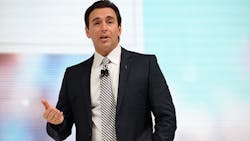Ford CEO Sees 'Pressure' on Business Without Softer Fuel Rules
Ford Motor Co. plans to lobby President-elect Donald Trump to soften U.S. and state fuel-economy rules that hurt profits by forcing automakers to build more electric cars and hybrids than are warranted by customer demand.
“In 2008, there were 12 electrified vehicles offered in the U.S. market and it represented 2.3 percent of the industry,” Mark Fields, chief executive officer of Ford, said in an interview at Bloomberg’s Southfield, Michigan, office Friday. “Fast forward to 2016, there’s 55 models, and year to date it’s 2.8 percent.”
This is not a formula for success, he said. “At the end of the day, you’ve got to have customers, so obviously, there would be pressure on the business if there’s not a market,” he said.
In 2011 -- when Ford and other automakers agreed with President Barack Obama to double average fuel economy that’s now projected at 50.8 miles per gallon by 2025 and to work with California to sell more zero-emission cars -- the companies counted on a mid-term review starting this year to see if the rules were working out as planned.
But the Environmental Protection Agency made a preliminary determination Wednesday that there’s no need to change the 2025 targets. In Friday’s interview, Fields warned that the agency’s action will disrupt the planned mid-term review.
‘Eleventh-Hour Politics’
“What happened was through eleventh-hour politics, it short-circuited a data-driven development of regulations,” he said.
Fields said Ford would now turn to Trump to continue the dialog as planned. For instance, the auto industry may seek clean-air credits for self-driving cars, which could reduce fuel consumption and emissions by helping traffic move more smoothly.
Despite the regulatory uncertainty, Fields said Ford has made no change in its plan to invest an additional $4.5 billion in electrified vehicles by 2020, and to install this technology in 40 percent of its nameplates.
Ford wants to continue to help boost fuel economy and lessen the industry’s environmental impact, because the company acknowledges climate change as a serious threat, Fields said.
